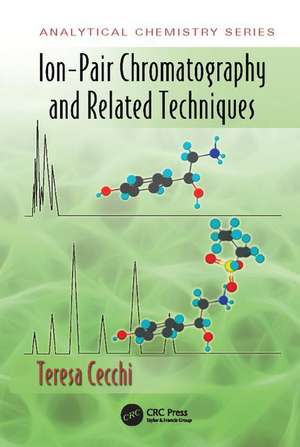Ion-Pair Chromatography and Related Techniques: Analytical Chemistry
Autor Teresa Cecchien Limba Engleză Paperback – 13 iun 2017
Theoretical modeling to application
Providing a thorough exploration of the multiplicity of interactions involved in an IPC system, this book emphasizes the progress from theoretical modeling to application. It explores the practical potential of IPC in the life science, medicine, pharmacology, forensic, food, and environmental sectors. It examines the upgrade of column technology and instrumentation to improve data quality and to increase sample throughput. The book also compares IPC to other instrumental methods of analysis and discusses the rising importance of the ion-pair concept in different analytical techniques.
Future endeavors
IPC has the potential to have lasting impact in the field of chromatography. Distilling the knowledge gained from preeminent research, this volume is a critical resource that is destined to stimulate future endeavors by separation scientists working in the area of high performance liquid chromatography.
Preț: 427.84 lei
Preț vechi: 552.57 lei
-23% Nou
Puncte Express: 642
Preț estimativ în valută:
81.89€ • 88.98$ • 68.83£
81.89€ • 88.98$ • 68.83£
Carte tipărită la comandă
Livrare economică 21 aprilie-05 mai
Preluare comenzi: 021 569.72.76
Specificații
ISBN-13: 9781138112063
ISBN-10: 1138112062
Pagini: 215
Ilustrații: 24
Dimensiuni: 156 x 234 mm
Greutate: 0.45 kg
Ediția:1
Editura: CRC Press
Colecția CRC Press
Seria Analytical Chemistry
ISBN-10: 1138112062
Pagini: 215
Ilustrații: 24
Dimensiuni: 156 x 234 mm
Greutate: 0.45 kg
Ediția:1
Editura: CRC Press
Colecția CRC Press
Seria Analytical Chemistry
Cuprins
Introduction. Electrolyte Solutions and Historical Concept of Ion-Pairing. Retention Modeling as Function of Mobile Phase Composition. Modeling of Retention as a Function of Analyte Nature. Stationary Phases. Developments in Column Technology and Fast IPC. Ion Pairing Reagents. Organic Modifiers. Role of Eluent pH in IPC. Temperature. Special IPC Modes and Variations. Detection and Combination. Examples of Applications. IPC versus Competitive Techniques. Ion-Pairing in Different Analytical Techniques. Non-Separative Applications of IPC. Conclusions and Future Research Needs.
Notă biografică
Teresa Cecchi earned a Ph.D. in chemistry from Camerino University in Italy in 1997. She focused on environmental chemistry at Institute Fresenius Gruppe, Germany and served as a consultant to food chemistry laboratories. After working as a researcher at Camerino University on the SUPREME project titled "Pigmentation in South American Camelids," she concentrated on ion pairing chromatography; her major research interests encompass many aspects of this technique including retention modeling, unusual analytes such as zwitterions, and application of this technique to non-separative functions. Dr. Cecchi’s career and studies also span the fields of food packaging chemistry, natural dyes, electrochemistry, and the antioxidant activities of nutraceuticals. She acted as the organizer of a research group at Istituto Tecnico Industriale Statale (It is) Montani in Italy and taught as a contract professor at La Sapienza University in Rome. She is currently a contract professor on the Faculty of Science and Technology at Camerino University, teaching master’s level courses in chemistry and advanced chemical methodologies and a professor of analytical chemistry at ITIS Montani. Dr. Cecchi is also involved in "Teaching of Experimental Sciences" and "Scientific Master Degrees," two projects whose purposes are, respectively, to improve the methodologies of teaching physical sciences, and to encourage students to study scientific subjects. She is the author of over 50 research articles, reviews, congress lectures, and other communications and was the corresponding author of an article that received an award from the Italian Research Evaluation Panel.
Recenzii
"… provides a broad coverage of the subject of IPC with regard to theoretical features, the parameters influencing the results and the applications. The reader will find a discussion of all aspects of IPC, beginning with the theoretical basis of this technique and its retention mechanism. The author introduces to the reader all the issues connected with stationary phases, ionpair reagents, organic modifiers, the pH of the eluent, temperature, and various detection techniques which may be used in IPC. One can also find much practical advice on how to start with IPC and how to improve results by the use of IPC."
—Analytical and Bioanalytical Chemistry, April 2012
—Analytical and Bioanalytical Chemistry, April 2012
Descriere
Providing a thorough exploration of the multiplicity of interactions involved in Ion-Pair Chromatography (IPC), this book emphasizes the progress from theoretical modeling to application. It explores the practical potential of IPC in the life science, medicine, pharmacology, forensic, food, and environmental sectors. It examines the upgrade of column technology and instrumentation to improve data quality and increase sample throughput. The book also compares IPC to other instrumental methods of analysis and discusses the rising importance of the ion-pair concept in different analytical techniques.






